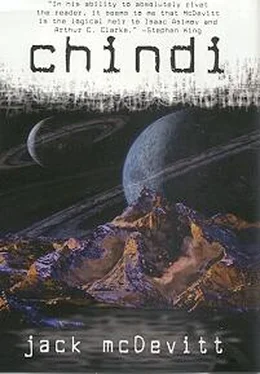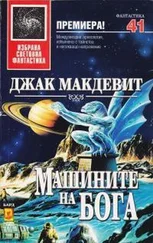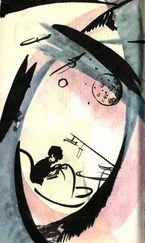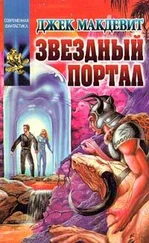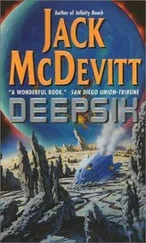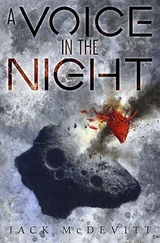During an intermission they broke away. He escorted Hutch back out to the taxi pad, and looked innocent when she suggested he’d made a conquest.
It was raining heavily. They rose through the storm, and he seemed pensive. “Hutch,” he said finally, “are you by any chance free tomorrow?”
“I’m headed for Princeton, Preach,” she said, “to see my mom.”
“Oh.”
“Why did you ask?”
“I was going to suggest dinner.” He shrugged the whole thing off. Bad idea. Should have known you’d be busy.
“She’s expecting me, Preach. Hasn’t seen me in a year. I can’t really beg off.” Her instincts were telling her just as well. Don’t rush things. Not if she was seriously interested in him. “Tell you what, though. I’ll be back Friday. How about we get together then?”
“Okay,” he said. “Call me when you get in.”
The taxi landed on the rooftop of her hotel. He told it to wait, got out, and went with her to her apartment door. She opened up and turned back toward him, debating whether to invite him inside. She’d been drinking a bit too much, as had he. “Thanks, Preach,” she said. “It was a lovely evening.”
“Me too.” He leaned toward her, planted a chaste kiss on her forehead, opening his lips and letting them linger just long enough to stoke her fire a bit. Knows what he’s doing, this lad. Then he took all decisions out of her hands by backing away. “You’re one of a kind, Hutch,” he said. And he wheeled and strode off.
She watched him disappear into the lift and had to fight off the sense that she was being an idiot. She closed the door softly and went to the window. Moments later she saw a taxi rise into the night and arc off in the general direction of the Crystal Tower.
Decadence has been given a bad name throughout history. The truth is, there is never a better era in which to be alive than a decadent one. The food is good, the liquor flows, women are usually willing, and somebody else is fighting the wars. It’s invariably the next generation that has to pick up the bill.
— GREGORY MACALLISTER, STROLLING THROUGH GOMORRAH, 2214
HUTCH CHECKED IN at the operations desk at midmorning and got her instructions. She was told to expect between six and eight passengers. Details weren’t finalized. There’d be a briefing at the Academy conference room on the Wheel on the sixth, and departure would be October 7.
She was also given a virtual tour of the City of Memphis. It was smaller by half than most of the Academy carriers. But her size was largely a function of reductions in space given over to propulsion systems, made possible by technological advances in both the Hazeltines and the fusion engines, whose specs indicated a level of efficiency beyond anything she’d seen before. Sensor arrays and communications systems were state-of-the-art, as were command and control functions.
The interior was reasonably spacious and eminently luxurious. The metal and plastic to which she was accustomed had been replaced with soft pseudo-leather, stained paneling, and lushly carpeted decks. Curtains and wainscoting were everywhere. The common room was attractively fitted out with the kind of furniture one might (almost) find at an expensive club. It also possessed an operations center with all the push buttons and displays one might wish to survey a new world. It would be rather like living in one of those grand twenty-first-century homes at the tip of Provincetown. The bridge had soft lighting and a series of scents that could be piped in, lemon and cedar and a dozen other fragrances. Give me a little time and I believe I can get used to this.
What about Bill?
The operations officer said that an AI package was available with the ship. Since Memphis was not an Academy vessel, the house intelligence had not been installed. What was her preference?
She opted for Bill.
She’d hoped Preach might turn up, but a discreet inquiry produced the information that he’d come in at nine, right after they’d opened, got his information, and left.
She felt deflated and thought about rescheduling her flight home into the late afternoon. That would allow her to call him and suggest they meet for lunch. Should have arranged that last night when the opportunity had been there. But she shrugged the idea away as ill-advised. Let’s not look anxious.
She treated herself to some new clothes, went back to her apartment, packed, and took a taxi out to National.
She was at her mother’s by seven.
HUTCH’S MOTHER, TERESA Margaret Hutchins, lived in Farleyville, a northern suburb of Princeton. She was waiting outside the house at the foot of the pad with a half dozen friends when the taxi descended. There were some ribbons in the trees, and a few of the neighborhood children had shown up to see what the fuss was about. The occasion lacked only the high school band.
Everyone was anxious to meet Teresa’s celebrated daughter. It was a ritual she went through every time she came back. My daughter the star-pilot.
Hutch’s taxi descended onto the landing pad. She paid up, climbed out, hugged her mother, hugged and shook hands with everybody else. And Mom started. “Priscilla was with the people who discovered the omega clouds,” she told a middle-aged woman whose name seemed to be Weepy.
And they responded as people always did at these homecomings:
“You must tell us how it was on Deepsix last year, dear.”
“Do you know my cousin Jamie? He works on the space station out at Quraqua.”
“It must be beautiful out there, traveling among the stars.”
In fact, it was impossibly dull. Now that she’d faced the reality, she was willing to admit to herself that she’d been living a kind of virtual life. Most of the beaches she’d visited in her lifetime had been electronic, as had the majority of her evenings looking out from mountaintops, strolling through idyllic forests, or wandering along the walkways of the world’s great cities. It occurred to her that the same was true of almost everyone’s life, but she dismissed the notion.
Hutch understood her mother’s pride in her daughter, but it made her uncomfortable. Hutch herself wasn’t good at pretending humility when she knew damned well she’d racked up some major accomplishments.
Still, there it was, so she bowed her head and tried to come up with the correct reactions as they trooped back to the house. She allowed as how it wasn’t very much, she’d been fortunate and had a lot of help. Certainly that was so.
Teresa broke out an assortment of goodies and soft drinks, and Hutch answered, as best she could, questions about why she had pursued so unusual a career, and did she plan to settle down anytime soon (she didn’t mention her retirement plans), and was it true that people usually got sick when the ships made that transition into the other kind of space, what did you call it? Jump-space?
“Hyperspace,” she said.
One of the visitors was a teacher, and he asked whether Hutch could come by the school while she was home and talk to an assembly. “We have a lot of students,” he said, “who would love to hear some of your experiences.”
She agreed, and a date and time were set.
Two single males, a history professor from Princeton, and a freelance financial advisor, made efforts to get close to her. Both were handsome, in a superficial, ground-based sort of way. Clean-cut features, clear skin, hair brushed back, good teeth. Stand back, she told herself. This is Mom at work.
The professor seemed overwhelmed by her celebrity, and compensated by smiling too much. He was at a loss to manage his end of the conversation. He’d like very much to get to know her better. Was lunch a possibility? He was so nervous she felt sorry for him.
Читать дальше
